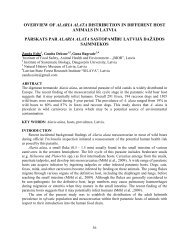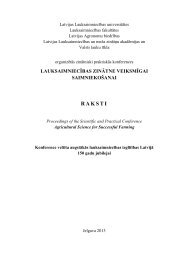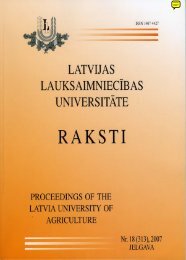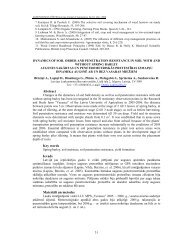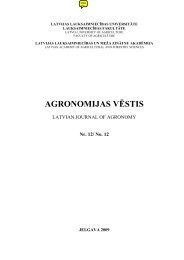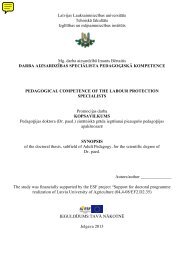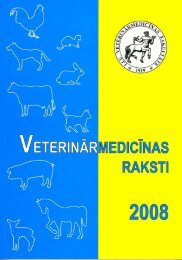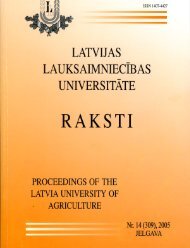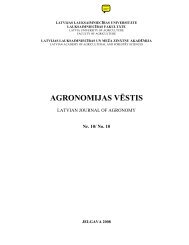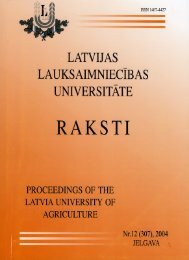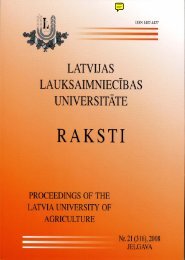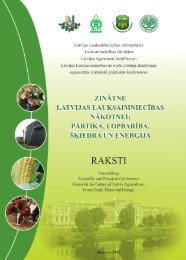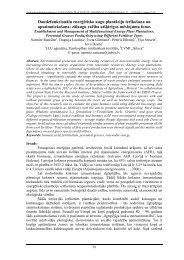Latvia University of Agriculture - Latvijas Lauksaimniecības ...
Latvia University of Agriculture - Latvijas Lauksaimniecības ...
Latvia University of Agriculture - Latvijas Lauksaimniecības ...
You also want an ePaper? Increase the reach of your titles
YUMPU automatically turns print PDFs into web optimized ePapers that Google loves.
A. Adamovičs et al. Research Activities <strong>of</strong> the Latest Decades in the Faculty <strong>of</strong> <strong>Agriculture</strong>Research Activities <strong>of</strong> the Latest Decades in the Faculty <strong>of</strong> <strong>Agriculture</strong>A. Adamovičs, A. Kārkliņš, M. Āboliņš, I.Alsiņa, B. Bankina, Z. Grīslis,D. Lapiņš, U. Osītis, A. Ruža, I. Turka, I. ŽukauskaFaculty <strong>of</strong> <strong>Agriculture</strong>Abstract. Research activities in the Faculty <strong>of</strong> <strong>Agriculture</strong> comprise three mainspecialisation lines: Field Crops, Horticulture and Animal Science which are associatedwith other subjects like Soil Science and Management, Grassland, Crops Breeding, Plantand Animal Biology, Plant Protection, Weed Science and Fertiliser Use etc. Traditionallyour research strategy is to be engaged in two directions: 1) to provide intellectual servicesand sound scientific basis for <strong>Latvia</strong> primary agricultural sector and 2) to incorporate intothe interdisciplinary research sector on <strong>Latvia</strong>, the EU and global scale. Brief overview <strong>of</strong>activities and results within these spheres is given related to the period starting from 1990up to now with relevant ideas and propositions for the future prospects. Interinstitutionaland international research cooperation and possibility to provide knowledge and servicesfor society are the main pillars <strong>of</strong> our future development.Key words: <strong>Latvia</strong> agriculture, research priorities, agricultural research.IntroductionIn 1992, two faculties – Faculty <strong>of</strong> Agronomy and Faculty <strong>of</strong> Zootechnics – weremerged and Faculty <strong>of</strong> <strong>Agriculture</strong> was established. Three main specialisation lines FieldCrops, Horticulture and Animal Science which are associated with other subjects like SoilScience and Management, Plant Biology, Plant Protection, Weed Science, Fertiliser Usewere organised within the Faculty. Therefore the main field <strong>of</strong> research and educationwas to provide students with competence in the primary agricultural production sector –crop and animal farming. At the same time some part <strong>of</strong> research activities were relatedto the environmental aspects, forestry and other sectors through cooperation with otherfaculties <strong>of</strong> <strong>Latvia</strong> <strong>University</strong> <strong>of</strong> <strong>Agriculture</strong> (LLU), research institutions in <strong>Latvia</strong> andabroad as well. This time was also very important due to the active start <strong>of</strong> internationalcooperation. Number <strong>of</strong> our staff and post-graduate students has a possibility to beinvolved in different workshops, to attend conferences, and to participate in study coursesand short–term on–site training programmes. Besides a number <strong>of</strong> foreign researchershave visited the Faculty and contributed to our research and teaching activities, andpromoted establishment <strong>of</strong> good pr<strong>of</strong>essional relationship. It has stimulated our researchactivities, staff involvement in international research programmes, and expert groups,and has given a good basis for long-term cooperation with international partners.Our research strategy is to follow the two lines: 1) to provide intellectual servicesand sound scientific basis for <strong>Latvia</strong> agricultural sector and 2) to incorporate into theinterdisciplinary research sector on <strong>Latvia</strong>, the EU and global scale. Therefore ourcontribution and achievements may vary and sometimes it is not easy to determinewhere our efforts have been more effective either for implementation <strong>of</strong> small andvery practice-oriented tasks or participation in large scale international projects. Ingeneral, the latter is good for knowledge and capacity building but the first one – foracknowledgement <strong>of</strong> our mission and importance for <strong>Latvia</strong>n society.The period starting from 1990 up to now has been rich in many research–relatedactivities; still it also reflected radical changes going on in economy and social sphere <strong>of</strong>this country. In the present article we would like to summarise only the main activities andchanges, and also to discuss the results that could be important for future developments.The layout <strong>of</strong> article reflects the main research lines traditionally existing in our Faculty.Soil science and soil fertilitySoil research obviously has a high importance due to its functions within ecosystemand as a media for agricultural production. Until 1990, the Soviet (Russian) soilscience approach and standards were dominating in <strong>Latvia</strong>. Their differences from theinternational standards caused real difficulties to use the national soil information outsidethe country. Therefore the introduction <strong>of</strong> FAO and the USA methodology <strong>of</strong> soil diagnosis,classification and information use was one <strong>of</strong> the research priorities. Series <strong>of</strong> field and4 <strong>Latvia</strong> <strong>University</strong> <strong>of</strong> <strong>Agriculture</strong> – 70, 2009



